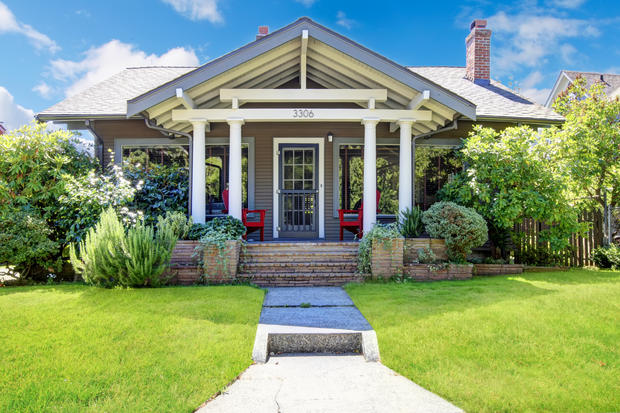Before you take on that home improvement project...
Embarking on a major home improvement can be exciting, but it's hardly without risks. Before you decide to put a chunk of your money (most likely borrowed) into your home, you need to think deeply about several things.
Before deciding on the specific improvements to make, take a tour of homes like yours in your area, including a few listed for sale. Visit several new developments to see what features newly constructed homes are offering. If several homes in your immediate neighborhood suddenly came on the market at the same time as yours, would the improvement you're considering make your home stand out?
Let's say your planned improvement appears to be worthwhile. Now you have to deal with contractors and estimates. If you plan on hiring a tradesman or contractor, you'll need to get bids or estimates from at least three qualified professionals. If there's strong demand for home improvement services in your area, this might be difficult to do, but don't skip this step.
Check references, ask to see similar completed jobs and request to see copies of general liability and worker's compensation insurance certificates.
Always ask for a written contract before you pay any money or begin work. The contract should include a complete description of the work (diagrams, drawings, etc.), a list of all materials, start and end date, the process for making changes to the project and warranties for all materials and work. Having a local attorney review any contract before you sign can save a lot of potential headaches later.
Then you have to think about how you'll finance the project.
The most common option is a home equity line of credit, whose amount is based on how much equity you have in the home (the value of the home in excess of the current mortgage amount). The lender's approval process includes a credit check and an appraisal of the home value.
Once this is done, the credit line can be approved and closed in a few weeks. Usually there are no closing costs, and you can draw on the line as needed to pay for the project. So you pay interest only on the amount you need to draw.
The interest rate is often tied to the prime lending rate, which is currently 3.5 percent. The downside is that the rate on these loans aren't fixed, so it'll go up (and cost more) as interest rates rise. Generally, home equity interest is tax deductible for loan amounts up to $100,000. In specific situations, this deduction may not be allowed (see IRS Publication 936, Home Mortgage Interest Deduction, for further details).
Another option is to refinance your current mortgage with a new mortgage equal to the amount of the current loan and the additional cash you need for the improvements. This typically makes sense if the interest rate on the new mortgage is about a half-point lower than the rate on your current mortgage. It can also lock in your interest rate and payments.
The downside is closing costs are typically incurred, which can be a significant percentage of the cash you need just for the improvement.
What if either of these aren't an option because you don't have enough equity in your home? Most banks don't allow you to borrow against your home's future value, after the improvement. If you could, you'd be able to borrow the cash you need for the improvement.
The U.S. Department of Housing and Urban Development (HUD) backs a loan program for homeowners in this situation, called Title I Home and Property Improvement Loan. The loans are offered by HUD-approved private lenders. The limit for single-family homes is $25,000 with repayment terms up to 20 years. Often no equity or appraisal is required.
The downside is that the interest rate will be several percentage points higher than the rates for a conforming mortgage or home equity loan. Use this HUD tool to find an approved Title I Lender in your area.
Even after your project is well under way, you're not through. When the project is almost finished and before you make the final payments, ask the contractor to obtain lien waivers from everyone the contractor is responsible for paying. Also, make sure to get a full release and waivers of all materials and mechanics liens upon full and final payment. This will help protect you from being slapped with liens by workers or suppliers who don't get paid by a cash-strapped contractor.
After a home renovation is complete, it's time to call your insurance agent to review your homeowner's insurance. Since your home's value has gone up, your coverage should also be increased, to at least 80 percent of the new replacement cost. This coverage amount ensures that partial losses are fully covered on a replacement-cost basis.
To be fully protected on a total loss, you must insure to 100 percent of the replacement cost. If you carry less than this minimum coverage, you'll receive payment for a percentage of the loss based on the percentage of the coverage bought versus the required limit. Remember to cover the value of additional contents and landscaping, too.

